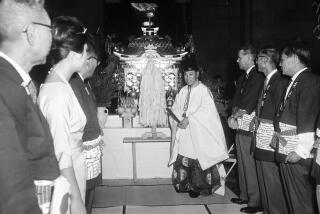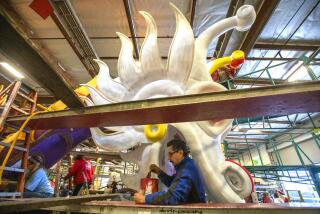Goddess of Democracy Replica Stirs Controversy : Chinatown: Hoping to avoid a dispute, the Chinese Chamber of Commerce banned the statue from today’s parade. But memories of Tian An Men Square prompt a protest.
- Share via
Eight months, 6,000 miles and a dramatic chapter of history removed from the student uprising it helped to inspire in Beijing, the Goddess of Democracy is in the middle of a controversy that is dividing the Chinese community in Los Angeles.
Fearing that it would provoke dissent among local Chinese, the Chinese Chamber of Commerce banned a float featuring a six-foot replica of the statue from the Chinese New Year’s parade it is sponsoring today in Chinatown.
As a result, the divisiveness the chamber said it had hoped to avoid has surfaced as pro-democracy supporters in Los Angeles react to the business organization’s decision.
Members of the Los Angeles chapter of the Federation for a Democratic China, which sought to enter the goddess float in the annual parade, are accusing the chamber of trying to erase from public memory the bloodshed that occurred last June in Beijing’s Tian An Men Square.
“It’s now the Chinese Chamber of Commerce that is crushing the symbol,” said David Ma of Arcadia, a board member of the Paris-based federation, formed last fall to promote democratic reform in China. He said his group will lead a protest decrying the chamber’s decision at today’s 3 p.m. parade.
Chamber board member Irvin Lai defended his organization’s stance by saying that his group is bound by its charter not to take sides on political issues.
“The chamber is a business organization,” Lai said. “We do not take part in partisan politics. We do not wish to promote divisiveness.”
The statue at the heart of the controversy is a replica of the one that Chinese troops bulldozed in Tian An Men Square last June after squelching pro-democracy protests there. It is smaller than a 23-foot replica erected in downtown Los Angeles last June and later moved to Chinatown, where it was destroyed by vandals.
The dispute between the chamber and the Federation for a Democratic China highlights a split in the Chinese community over whether the time has come to put the Beijing massacre in the past.
After the chamber’s 14-4 vote last week to deny the Goddess of Democracy entry to the parade, federation members immediately wrote a letter of protest to the chamber board. The letter accused chamber members of “betraying their consciences” and helping people to forget the bloodshed in China last summer.
For years, cultural celebrations in the Chinese community have been used by some as opportunities to express political loyalties. In San Francisco’s Chinatown, for example, merchants on one side of a street will fly flags of communist China on Oct. 1--China’s national holiday--while merchants on the other side will display flags recognizing the Taiwan government’s national holiday on Oct. 10.
Lai said that in Los Angeles, the chamber has always rejected attempts by various groups to use its New Year’s parade as a political forum. In the past, he said, the chamber has denied requests by groups who want to fly foreign flags on the floats. “We’re strictly an American organization,” Lai said.
“I don’t think the Goddess of Democracy is political,” Ma said. The statue, in his opinion, stands for human rights and is an American symbol. “She just symbolizes our system, our way of life, our values. What we want to display on the float is the symbol of Americans for two centuries.”
Ma said his group was willing to compromise by eliminating from its float the banners that would have referred to the Communist leadership’s bloody crackdown in Tian An Men Square. But Chamber President Ken Chan said the chamber never received such a proposal from the federation.
Chan said denials of float applications are routine, and that the federation’s entry was not singled out. “They are not the only ones denied.”
He declined, however, to cite examples of other unsuccessful applicants to the parade, which the chamber has sponsored in Chinatown for decades.
Some in the Chinese community have also questioned whether business ties between the chamber and the Chinese government might have influenced the group’s decision, but chamber board member Fred Hong noted that the chamber’s 150 to 200 members do business not only with China, but also with Taiwan and Hong Kong.
Ma said he respects the chamber’s right to stay neutral, but he added that he believes Chinese-Americans should not be discouraged from speaking out for democracy in their homeland.
“Our Chinese community is divided,” Ma said. “Let’s face it. A lot of people have different opinions vis-a-vis democracy in China.”
More to Read
Sign up for Essential California
The most important California stories and recommendations in your inbox every morning.
You may occasionally receive promotional content from the Los Angeles Times.










